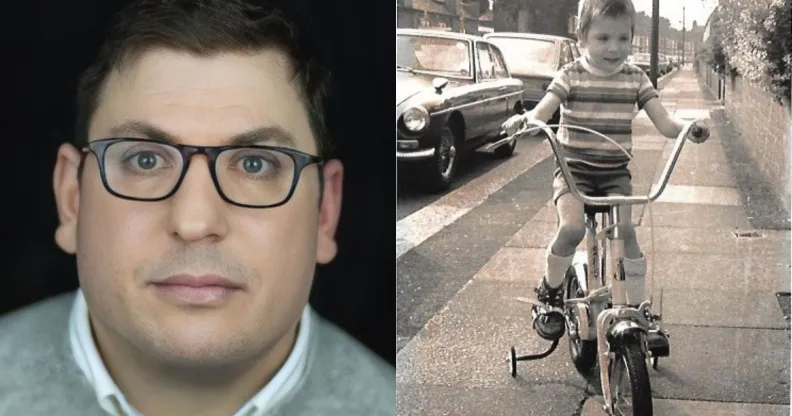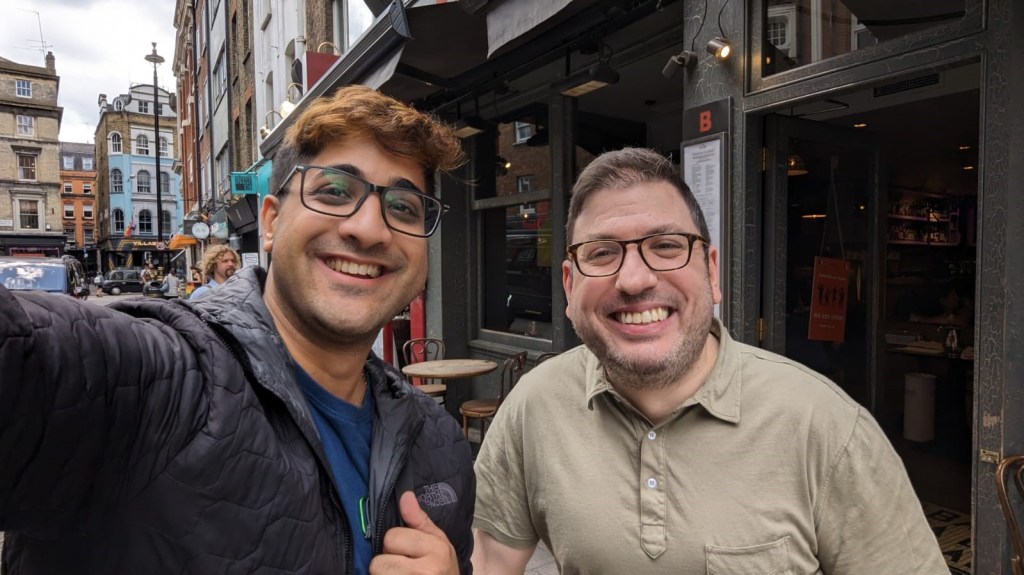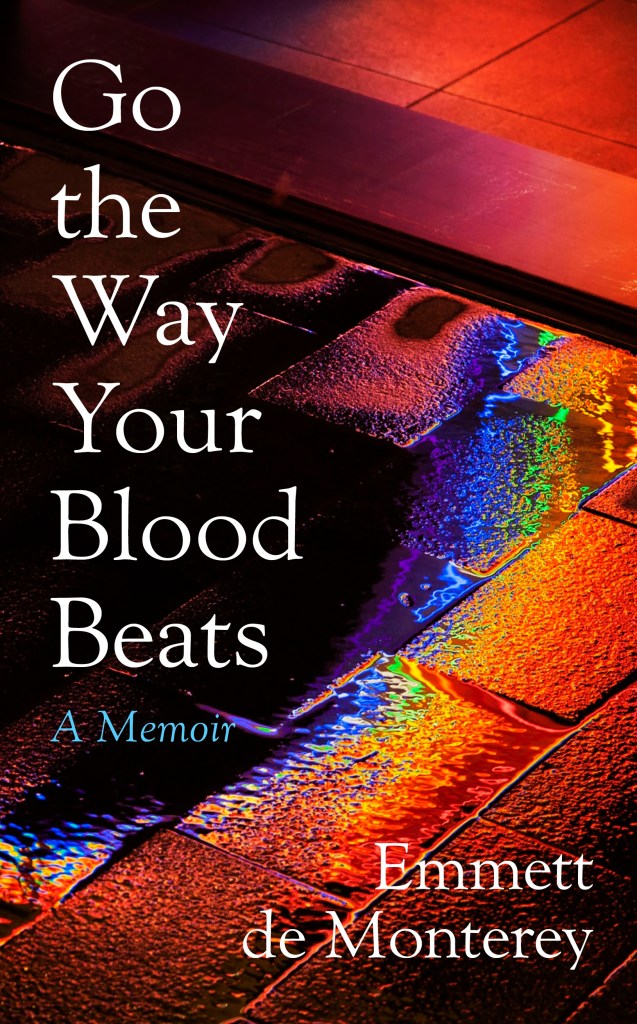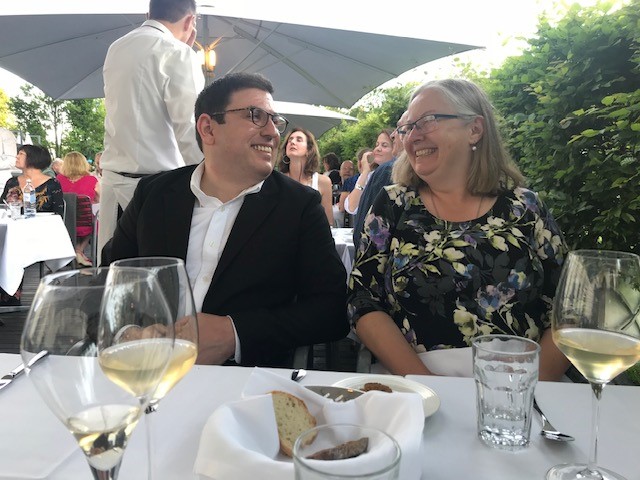Growing up gay with cerebral palsy: ‘Too gay for the disabled people and too disabled for the gays’

Emmett de Monterey felt rejected by both the disabled community and by the gay community growing up. (Penguin)
At age 11, Emmett de Monterey became a media sensation as the boy flown to America for a so-called “miracle cure” for cerebral palsy. He talks about internalising this toxic, ableist narrative, and the rejection he faced for being both disabled and gay.
Emmett can pinpoint the exact moment he realised he was disabled.
Growing up with cerebral palsy, he had assumed, in his childish innocence, that his disability was a developmental phase every child went through – that he would one day “grow out of it”.
One day, when out walking with his mum, he noticed the differences in their shadows on the pavement. While he walked along with crutches, his mother walked in an “easy, slouchy way”.
“It was really quite alarming to me as a child because I thought, I’m so different from this person that I love,” Emmett tells PinkNews
It was a difficult realisation – but what made it harder to accept was the prevailing logic of the 1980s, that there was something “wrong” with disabled people. Growing up, Emmett internalised the view that his cerebral palsy was a problem.
As a child, he found himself plastered all over the tabloids – and the subject of a BBC documentary – when he was signed up for a pioneering surgical procedure in the United States that was supposed to improve his walk.

But that wasn’t the narrative the newspapers went with. While doctors told Emmett, then 11, that he would never walk unaided, tabloids sensationalised his story. He quickly became the boy who was being flown out to America for a “miracle cure”.
“I chose to internalise the tabloid narrative that I was going to be a miracle, so when I came back to England and I was recovering and the miracle didn’t happen I had to go through a grieving process even though it was nobody’s fault – because I hadn’t been misled.”
Emmett in no way regrets the surgery – he says he wouldn’t be walking as well as he is today without it – but the experience was exhausting and emotionally draining for both him and his parents.
“It was a bit peculiar to be in a situation where I didn’t feel like I had any agency or control, and I was also being projected onto quite heavily as symbolic of this miracle. So when that didn’t occur I could kind of see that people were a bit disappointed.”
In his powerful new memoir Go the Way Your Blood Beats, Emmett writes about the moment he returned to school after his surgery. Newspaper reporters, photographers and cameramen turned up to catch a glimpse of his “miracle” cure, but instead they saw a small boy – still recovering – using a “big walker”.

“You could almost see the journalists going, ‘This is not what we were led to expect from the rhetoric around this process’,” he says.
In the months that followed, Emmett struggled to accept the outcome of his surgery. There were small improvements, but he still had cerebral palsy.
Even though he was still just a child, he also had to come to terms with the fact that many in the disabled community were not best pleased by his documentary and media coverage. In fact, many felt angry and let down.
“The medical model of disability posits that the disabled individual needs to be fixed or somehow normalised by surgical intervention, and I had completely swallowed this idea,” Emmett explains.
“It sounds naive now but it hadn’t even occurred to me that there were other ways to be and that I could embrace being disabled as an identity.
“It was really striking for me when people took my decision as a sort of betrayal to the cause, like I’d let down the disabled community. That was really shocking to me because as a child all I was trying to do was be like my peers. I wanted to be as much like my friends as I could possibly be.
“Looking back at it in midlife I can see how much I’d internalised that ableism and the prejudices that I was experiencing in wider society.”

Emmett de Monterey went to boarding school and realised he’s gay
That sense of rejection from his own community worsened again when he was sent to a boarding school for children with disabilities.
“To them I was the boy on the telly who’d flown to America to get fixed, so they saw me as rejecting them as a disabled community because I’d tried to ‘fix’ myself.”
It wasn’t long before his classmates picked up on the fact that he was different. Emmett was 14 years old and was gradually coming to the realisation that he was gay.
“They obviously picked up on something in me, my manner. I was earmarked immediately as something that was dangerously different in that environment and that was really difficult.
“I was in this environment where I was told I belonged but actually I’d never felt more lonely or more alienated from people that were ostensibly my community.”
Facing rejection from his peers at that pivotal time in his life led Emmett to hope he would find greater acceptance in the gay community – but his early experiences in gay bars and queer venues left him feeling more alienated than ever.
‘I’m too gay for the disabled people and I’m too disabled for the gays, so where do I go?’
“I felt sure – misguidedly, as it turns out – that because of the rainbow flag and because of the rhetoric about inclusivity that I would find a place. So when I did pluck up the courage to go to a gay bar it was quite a shock.
“It was a very lonely and difficult time. I remember leaving the gay bar the first time I’d been and thinking, ‘Well, what do I do now? Where do I go? I’m too gay for the disabled people and I’m too disabled for the gays, so where do I go? Where’s my chosen family? Where do I find my tribe?’ I’m lucky that I did [find it] but it took a while.”
While Emmett eventually found his own chosen family, he still sees ableism everywhere in society – and says it’s rampant within the LGBTQ+ community too.
“There’s a great deal of work still to do. Quite how it gets done I don’t know.
“It sounds a strange thing to say given that I’ve got my happy ending myself but I think that, yes, it’s still very difficult for disabled people if they find themselves to be anything other than heterosexual – and even being heterosexual is quite challenging because ultimately society would still rather that we weren’t visible.”
It was that enforced invisibility that made Emmett want to share his story in his own words – to reclaim his own narrative years after tabloids cast their own agenda onto his narrative.
“I wanted to write the book as an act of positive representation,” he says.
“The more we can amplify positive stories and the more we can amplify diverse narratives – I think that’s all to the good.”
How did this story make you feel?

